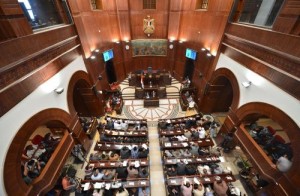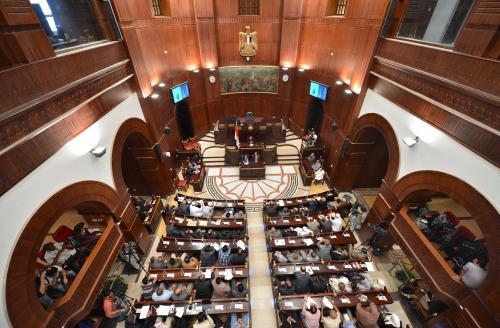
The Tunisian constitution will not include any references to Islamic Shari’a law.
Tunisian newspaper Al-Chourouk released the first draft of the constitution, written by the Tunisian Constituent Assembly, on Monday.
The draft is still in a preliminary phase and most articles on system of governance are not finalised. Articles on the fundamentals of state, rights, and freedoms are complete, however.
Unlike the Egyptian draft constitution, which establishes Islamic Shari’a as the main source of legislation and allows Christians and Jews to apply their own religious laws, the Tunisian draft does not mention religious laws.
Although both constitutions establish Islam as the state religion, the ways each draft interprets it are vastly different.
The “fundamentals of Islam” are one of the bases of the Tunisian state according to the preamble. They are defined as “openness, moderation, higher human values all inspired from the cultural heritage of the Tunisian people.”
In contrast, the Egyptian draft constitution draft defines the “principles” of Shari’a as “including its holistic evidences; fundamental and doctrinal laws, and trusted sources in the Sunni Islam schools of thought.”
The Tunisian draft establishes the state’s protection of religion in general, but does not mention Islam specifically. The religious protection translates into the protection of freedom of belief and worship. The Egyptian draft also establishes freedom of belief but limits freedom of worship to adherents of Abrahamic religions.
Al-Azhar is established in the Egyptian draft as an independent Islamic body with mandate to spread Islam all over the world. It gives the religious institution’s Council of Senior Scholars an advisory role in determining the principles of Islamic Shari’a, which legislation is to be based on.
In contrast, the Tunisian protection of religion clause obliges the state to ensure religious institutions are politically neutral and prevents political groups from campaigning within them.
A proposed Tunisian article limits the presidency to Muslims, but there are counter proposals allowing citizens of all religious backgrounds. It is yet to be determined whether the state will be semi presidential or parliamentary, but in both cases the prime minister, who will exercise power equal to or greater than the president, can be of any religious background.
The Tunisian constitution establishes citizens’ right to political opposition. The Egyptian one mentions no such right. Both constitutions protect freedom of speech and expression, although the Egyptian one limits this under the regulation of the law.
Unlike its Egyptian counterpart, the Tunisian draft does not pledge the state’s protection for, or make it the duty of citizens to protect, “traditional values,” “cultural and linguistic unity,” or oblige the state to ensure adherence to “public morals.”
The Tunisian state is based on decentralisation, while the Egyptian central government maintains heavy control over local administrative unites according to their respective constitutions.
As for rights and freedoms, the Tunisian constitution has several rights such as the right to life, which the Egyptian one does not. The Tunisian constitution explicitly bans physical and mental torture. The word torture is not even mentioned in the Egyptian draft despite police brutality being one of the main causes of the 25 January 2011 uprising.
Another right provided by the Tunisian constitution absent from the Egyptian one, is the “right to private life, privacy of communications, inviolability of homes” and choosing where to reside.
Political parties, unions and syndicates are to be formed freely in Tunisia unlike the Egyptian constitution, which requires the notification of the authorities and, in case of unions and syndicates, requires governmental approval.
Freedom of association and peaceful protests, as well as the right to stage labour strikes, are guaranteed by the Tunisian constitution. The Egyptian draft does not mention the latter and restricts the former two under the regulations of the law.
Socioeconomic rights in each draft are also different. Although the Egyptian constitution grants the right to housing, healthcare, work and others, the state is not obliged to provide these rights.
The Tunisian draft for example obliges the state to provide all citizens with healthcare and to provide free healthcare for those who cannot afford it. The state must also provide a safety net for society.
Gender equality is also tackled differently. The Egyptian state is to sponsor gender equality only within the confines of the rulings of Shari’a. No such provision exists in the Tunisian constitution in which the state must protect gender equality in absolute terms.
Women’s rights are addressed in the Tunisian constitution, in more detail in another, separate article as well. The state is obliged to provide equal opportunities between the sexes and works to eradicate all forms of violence against women.
Freedom of the press is also absolutely guaranteed and there is a specific clause prohibiting any form of prior restraint on the media, a concept absent from the Egyptian draft. The Tunisian state must encourage all forms of creativity that serve national culture and opens it up to global culture.
It must also support all forms of producing and consuming cultural creativity that support multicultural identities and promote tolerance, rejection of violence, openness to other cultures, and dialogue with other civilisations.
Finally, the Tunisian constitution bans all forms of normalisation with Zionism or Israel, referred to as “the Zionist entity,” an issue not addressed in the Egyptian draft, although Egypt borders Israel.
The Tunisian constituent assembly will now refer constitutional articles that the committees were not able to agree upon, to the assembly’s executive office. Further on, the different suggestions made for these articles will be put to vote in the assembly at large.
This constitution will pass if two thirds of the assembly vote to pass it. If more than half but less than two thirds of members vote to pass it, it will be put to a nationwide referendum.




